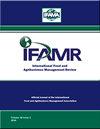规模分化视角下的社会嵌入性与农业技术扩散——以中国为例
IF 1.5
4区 经济学
Q3 AGRICULTURAL ECONOMICS & POLICY
International Food and Agribusiness Management Review
Pub Date : 2022-08-25
DOI:10.22434/ifamr2021.0130
引用次数: 1
摘要
社会嵌入性在促进农业技术传播中一直起着重要作用。然而,在中国,从“熟人社会”到“半熟人社会”的转变过程中,农村家庭的社会嵌入性发生了巨大的变化。这可能是关于社会嵌入作用的争论的原因吗?不同土地规模农户的社会嵌入性作用有何差异?基于浙江省583户农户的调查数据,我们采用内生转换回归模型来回答这些问题。研究结果显示,大户家庭与小户家庭的社会嵌入性存在显著差异。虽然社会嵌入性对技术采用的影响仍然显著,但其功能在小农和大农之间存在显著差异。为避免小农的技术锁定,政府应加强信息推送,扩大对小农环境友好型农业补贴的覆盖范围。本文章由计算机程序翻译,如有差异,请以英文原文为准。
Social embeddedness and agricultural technology diffusion from the perspective of scale differentiation – a case study from China
Social embeddedness always plays important role in facilitating agricultural technology diffusion. However, in China, dramatic changes have occurred in the social embeddedness of rural households in the transition from ‘acquaintance society’ to ‘semi-acquaintance society’. Could this be the reason for the debate over the role of social embeddedness? What are the differences in the role of social embeddedness between farmers with different land scales? Based on survey data from 583 rural households from Zhejiang Province, China, we used an endogenous switching regression model to answer these questions. The results indicated there are significant differences in social embeddedness between large- and small-scale households. Although the influence of social embeddedness on technology adoption remains significant, its function is significantly different between small- and large-scale farmers. To avoid technological lock-in for small-scale farmers, the government should strengthen the information push and expand the coverage of environmental-friendly agricultural subsidies for them.
求助全文
通过发布文献求助,成功后即可免费获取论文全文。
去求助
来源期刊

International Food and Agribusiness Management Review
AGRICULTURAL ECONOMICS & POLICY-
CiteScore
2.90
自引率
0.00%
发文量
0
审稿时长
>12 weeks
期刊介绍:
The IFAMR is an internationally recognized catalyst for discussion and inquiry on issues related to the global food and agribusiness system. The journal provides an intellectual meeting place for industry executives, managers, scholars and practitioners interested in the effective management of agribusiness firms and organizations.
IFAMR publishes high quality, peer reviewed, scholarly articles on topics related to the practice of management in the food and agribusiness industry. The Journal provides managers, researchers and teachers a forum where they can publish and acquire research results, new ideas, applications of new knowledge, and discussions of issues important to the worldwide food and agribusiness system. The Review is published electronically on this website.
The core values of the Review are as follows: excellent academic contributions; fast, thorough, and detailed peer reviews; building human capital through the development of good writing skills in scholars and students; broad international representation among authors, editors, and reviewers; a showcase for IFAMA’s unique industry-scholar relationship, and a facilitator of international debate, networking, and research in agribusiness.
The Review welcomes scholarly articles on business, public policy, law and education pertaining to the global food system. Articles may be applied or theoretical, but must relevant to managers or management scholars studies, industry interviews, and book reviews are also welcome.
 求助内容:
求助内容: 应助结果提醒方式:
应助结果提醒方式:


